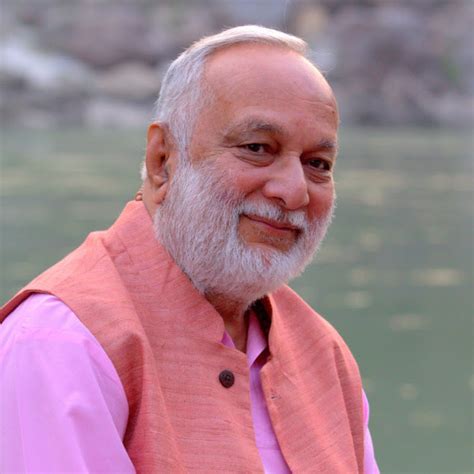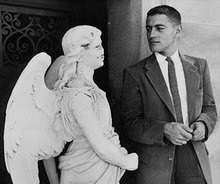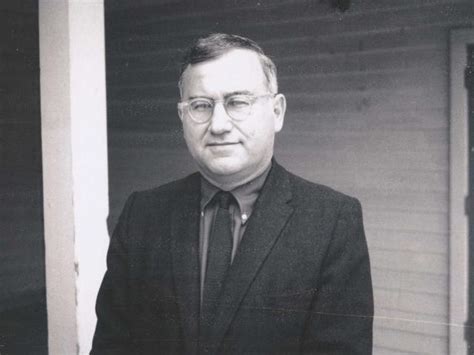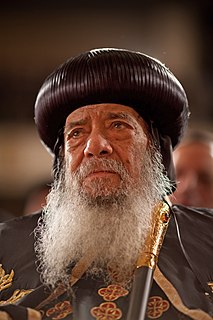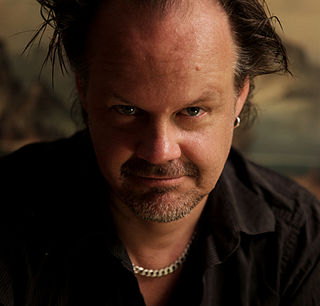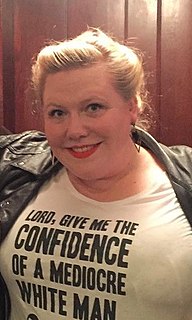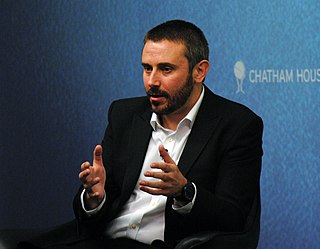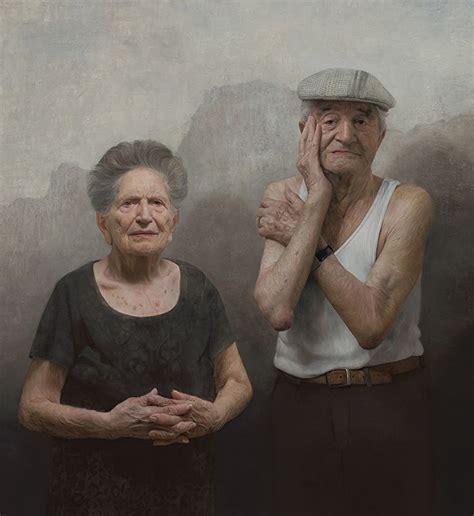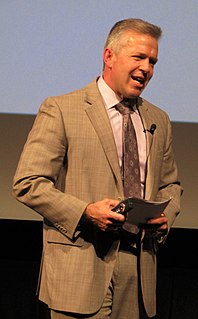Top 649 Discourse Quotes & Sayings - Page 11
Explore popular Discourse quotes.
Last updated on April 17, 2025.
The line-by-line, sequential, continuous form of the printed page slowly began to lose its resonance as a metaphor of how knowledge was to be acquired and how the world was to be understood. "Knowing" the facts took on a new meaning, for it did not imply that one understood implications, background, or connections. Telegraphic discourse permitted no time for historical perspectives and gave no priority to the qualitative. To the telegraph, intelligence meant knowing of lots of things, not knowing about them.
The moment our discourse rises above the ground-line of familiar facts, and is inflamed with passion or exalted thought, it clothes itself in images. A man conversing in earnest, if he watch his intellectual processes, will find that always a material image, more or less luminous, arises in his mind, contemporaneous with every thought, which furnishes the vestment of the thought.... This imagery is spontaneous. It is the blending of experience with the present action of the mind. It is proper creation.
The domestic NSA-led Surveillance State which Frank Church so stridently warned about has obviously come to fruition. The way to avoid its grip is simply to acquiesce to the nation's most powerful factions, to obediently remain within the permitted boundaries of political discourse and activism. Accepting that bargain enables one to maintain the delusion of freedom - "he who does not move does not notice his chains," observed Rosa Luxemburg - but the true measure of political liberty is whether one is free to make a different choice.
I have received your letter of the 6th, with the eloquent discourse delivered at the consecration of the Jewish Synagogue. Having ever regarded the freedom of religious opinions and worship as equally belonging to every sect, and the secure enjoyment of it as the best human provision for bringing all either into the same way of thinking, or into that mutual charity which is the only substitute, I observe with pleasure the view you give of the spirit in which your sect partake of the blessings offered by our Government and laws.
It is becoming plain that our liberal regime of equality and personal freedom depends, more than most theorists of liberalism have been willing to admit, on the existence and support of certain social assumptions and practices: the belief that each and every human being possesses great and inherent value, the willingness to respect the rights of others even at the cost of some disadvantages to one's self, the ability to defer some immediate benefits for the sake of long-range goals, and a regard for reason-giving and civility in public discourse.
Our support for the Shah, the CIA coup in 1953 - has become infused into the Iranian political discourse. The regime that came to power in 1979 during the Iranian revolution actually defined itself as anti-American, and that's now a critical ingredient in the Iranian domestic political debate. That really is the source of our problems - the regime in Tehran continues to see itself as opposing the US. In their eyes, everything the US does is directed at them in a very malevolent way, and therefore they have to fight back against it.
Osho used me and Shunyo (my girlfriend at the time) as an example of how he envisioned men and women should relate. He shared a story he had often told in discourse of a man and woman who lived at opposite ends of a lake. They were deeply in love but only met by chance when sometimes out rowing on the water. He said it was beautiful how Shunyo and I met like this couple. When we had the feeling to be together, we would meet and enjoy. And when we were apart, we were also happy and content in our aloneness.
I wish to put together an imaginary nation. It is my belief that no other nation is possible, or rather, I believe that authors who count take responsibility for a map which is addressed to travellers of the earth, the world, and the spirit. Each issue is composed as a map of this land and this glory, images of our cities and of our politics must join our poetry. I want a nation in which discourse is active and scholarship is understood as it should be, the mode of our understanding and the ground of our derivations.
-Robin Blaser (June 3, 1967)
God himself, finding he was in the midst of spirits and glory, because he was more intelligent, saw proper to institute laws whereby the rest could have a privilege to advance like himself. The relationship we have with God places us in a situation to advance in knowledge. He has power to institute laws to instruct the weaker intelligences, that they may be exalted with Himself, so that they might have one glory upon another, and all that knowledge, power, glory, and intelligence, which is requisite in order to save them in the world of spirits. (King Follett Discourse)
I would say the only one person I know of who kind of combines the elements that my father brought to the table in terms of affecting the public discourse would be Oliver Stone. His combination of academic brilliance and real life experience and just understanding people I think is what makes him such a great storyteller, but also he cares. He is interested. He meets somebody and he listens to them. He has some questions. He wants to know what they're about. And as a result I think his worldview is much more complex and whole and most of the other.
Johnson is wise, Boswell foolish; Johnson warns and abstains, Boswell plunges; Johnson is rather a great man writing than a greatwriter, Boswell is a great writer and an ordinary man; and they are two of a kind, abysmal melancholics and compulsive socializers, afraid of solitude and afraid of death and dissolution, victims of themselves, meant for each other, needing each other, needing evidence and arguments (Boswell is a lawyer, Johnson magisterially dictates to him some of his briefs), making beautiful models of rational discourse out of the useful substance of all they know.
There is a certain standard of grace and beauty which consists in a certain relation between our nature, such as it is, weak or strong, and the thing which pleases us. Whatever is formed according to this standard pleases us, be it house, song, discourse, verse, prose, woman, birds, rivers, trees, room, dress, and so on. Whatever is not made according to this standard displeases those who have good taste.
In the Lord's discourse on spiritual nourishment, we hear Him says: "Do not labor for the food which perishes, but for the food which endures to everlasting life." (John 6:27). He then continued by talking about the true bread from Heaven the bread of God, and the bread of life. (John 6:32-35). Here He appeals to the soul for its nourishment and our thoughts to the spiritual way so as not to occupy our minds with the body and its needs.
People knew there were two ways of coming at truth. One was science, or what the Greeks called Logos, reason, logic. And that was essential that the discourse of science or logic related directed to the external world. The other was mythos, what the Greeks called myth, which didn't mean a fantasy story, but it was a narrative associated with ritual and ethical practice but it helped us to address problems for which there were no easy answers, like mortality, cruelty, the sorrow that overtakes us all that's part of the human condition. And these two were not in opposition, we needed both.
I think we should be very clear on this. You know, this country was founded on the principles of the Enlightenment... It was the idea that people could talk, reason, have dialogue, discuss the issues. It wasn't founded on the idea that someone would get struck by a divine inspiration and know everything right from wrong. I mean, people who founded this country had religion, they had strong beliefs, but they believed in reason, in dialogue, in civil discourse. We can't lose that in this country. We've got to get it back.
The conscious mind is a maelstrom of fleeting thoughts, images, sensations, feelings, conflicting desires, and doubts; barely able to confine its attention to a single clear objective for a microsecond before secondary thoughts begin to adulterate it and provoke yet further trains of mental discourse. If you do not believe this, then attempt to confine your conscious attention to the dot at the end of this sentence without involving yourself in any other form of thinking, including thinking about the dot.
[Regarding] the soul, I'm a little wary of any discourse on that topic that pretends to have an answer, so I tend to keep my musings to myself. There is interesting, legitimate metaphysical work on the topic going at least as far back as Leibniz and continuing today, following the theme that consciousness, or at least computation, might be at least as fundamental as phenomena such as space, time, energy, and matter, which are the usual subject matter of physics. I follow that sort of thing with interest but with very modest expectations that answers will be arrived at during my lifetime.
There are some really great books that have been written about slavery, but I don't think that the discourse about it in society has been very accurate or healthy. I don't think we've come up with ways to tell it that don't insult people or hit them in the wrong way. Part of the problem is that most people don't really understand what slavery was anyway. Most white people didn't own slaves. Slavery was a way of life, just like driving cars is a way of life now. It doesn't mean that it was right.
The desire for story is very, very deep in human beings. We are the only creature in the world that does this; we are the only creature that tells stories, and sometimes those are true stories and sometimes those are made up stories. Then there are the larger stories, the grand narratives that we live in, which are things like nation and family and clan and so on. Those stories are considered to be treated reverentially. They need to be part of the way in which we conduct the discourse of our lives and to prevent people from doing something very damaging to human nature.
In the case of Donald Trump I think you've got to accept that a lot of what's going on in political discourse is based upon judgement. How the economy works - how people work - what will come to pass - what will not come to pass - what is possible - what is not possible. There is this whole modal dimension. There's a lot in politics that is making a judgement about what might be and can be and would be. Trump frightens a lot of people but there is a bizarre possible world in which it turns out as he's vindicated, though most of us think the evidence is against it.
I always loved horror as a kid. On the one hand, I really love monsters, because in a way I feel like I related to their outsider status and like the sentimental romantic plight of the monster. More importantly though I feel like people are completely motivated by fear, especially with our political system here in America which is just degenerating into more and more fear mongering and it gets in the way of real discourse, plus it's just something I'm obsessive about and have always been a little bit of a paranoid guy.
There's something behind the decision to choose to lash out at a woman. The answer to how to fix internet trolling is like fixing sexism. How do you do that? I'm of the opinion that discourse helps, that changing people's minds changes people's actions. On a more practical level, I do enjoy sassing back at trolls, because I always win, because my job makes me better at arguing. If I can frustrate or embarrass a troll, then that lodges in that person's brain that trolling me is not a consequence-free hobby.
What else is it that should trace the insuperable line? Is it the faculty of reason or perhaps the faculty of discourse? But a full-grown horse or dog is beyond comparison a more rational, as well as more conversable animal, than an infant of a day or a week or even a month old. But suppose they were otherwise, what would it avail? The question is not, Can they reason?, nor Can they talk? but, Can they suffer? Why should the law refuse its protection to any sensitive being? The time will come when humanity will extend its mantle over everything which breathes.
The appearance in nineteenth-century psychiatry, jurisprudence, and literature of a whole series of discourses on the species and subspecies of homosexuality, inversion, pederasty, and "psychic hermaphroditism" made possible a strong advance of social controls into this area of "perversity"; but it also made possible the formation of a "reverse" discourse: homosexuality began to speak in its own behalf, to demand that its legitimacy or "naturality" be acknowledged, often in the same vocabulary, using the same categories by which it was medically disqualified.
Then I speak to her in a language she has never heard, I speak to her in Spanish, in the tongue of the long, crepuscular verses of Díaz Casanueva; in that language in which Joaquín Edwards preaches nationalism. My discourse is profound; I speak with eloquence and seduction; my words, more than from me, issue from the warm nights, from the many solitary nights on the Red Sea, and when the tiny dancer puts her arm around my neck, I understand that she understands. Magnificent language!
Our tragedy today is not just that millions of people who called themselves communist or socialist were physically liquidated in Vietnam, Indonesia, Iran, Iraq, Afghanistan, not just that China and Russia, after all that revolution, have become capitalist economies, not just that the working class has been ruined in the United States and its unions dismantled, not just that Greece has been brought to its knees, or that Cuba will soon be assimilated into the free market - it is also that the language of the Left, the discourse of the Left, has been marginalised and is sought to be eradicated.
If you're a human being, you'd have to be terrified. The impunity ... That these guys can sit on a TV show and just chat in a relaxed way about killing people like Julian Assange. They're joking, but at the same time, it's a vicious kind of rhetoric. The degree of enmity and the show of power and force against Assange must have terrified him. He was prepared to be paranoid when he was young - when nobody was actually after him. But this easy kind of vitriol and hatred that you now see as part of common discourse, it's become part and parcel of our everyday chatter.
Once infected, the individual [infected with a god virus] cannot detect major contradictions in his beliefs and behavior. Belief systems become self-evident to him, and no amount of logical discourse will move him from his belief. If a Mormon and Catholic were to debate the merits of their respective religions, neither could see his own inconsistencies and logical fallacies, but would see the other's quite clearly.
When I look at the Republicans, I am tempted to dismiss them as the Treason Party. Seriously, were a band of traitors to concoct a series of positions deliberately designed to weaken America, they would be hard pressed to beat the current GOP dogma - hobble education, starve the government by slashing taxes to the rich, kneecap attempts to jumpstart the economy by fixating on debt, invite corporations to dominate political discourse, balkanize the population by demonizing minorities and immigrants and let favored religions dictate social policy.
Have you ever noticed that the only metaphor we have in our public discourse for solving problems is to declare war on it? We have the war on crime, the war on
cancer, the war on drugs. But did you ever notice that we have no war on homelessness? You know why? Because there's no money in that problem. No money to be made off of the homeless. If you can find a solution to homelessness where the corporations and politicians can make a few million dollars each, you will see the streets of America begin to clear up pretty damn quick!
I think the press, by and large, is what we call "liberal". But of course what we call "liberal" means well to the right. "Liberal" means the "guardians of the gates". So the New York Times is "liberal" by, what's called, the standards of political discourse, New York Times is liberal, CBS is liberal. I don't disagree. I think they're moderately critical at the fringes. They're not totally subordinate to power, but they are very strict in how far you can go. And in fact, their liberalism serves an extremely important function in supporting power.
While self-interest arising from the enjoyment of meat eating is obviously one reason for its entrenchment, and inertia another, a process of language usage engulfs discussions about meat by constructing the discourse in such a way that these issues need never be addressed. Language distances us from the reality of meat eating, thus reinforcing the symbolic meaning of meat eating, a symbolic meaning that is intrinsically patriarchal and male-oriented. Meat becomes a symbol for what is not seen but is always there--patriarchal control of animals and of language.
The term "globalization," like most terms of public discourse, has two meanings: its literal meaning, and a technical sense used for doctrinal purposes. In its literal sense, "globalization" means international integration. Its strongest proponents since its origins have been the workers movements and the left , which is why unions are called "internationals", and the strongest proponents today are those who meet annually in the World Social Forum and its many regional offshoots.
For black America needs a politics whose first mission isn't the reinforcement of the idea of black America; and a discourse of race that isn't centrally concerned with preserving the idea of race and racial unanimity. We need something we don't yet have: a way of speaking about black poverty that doesn't falsify the reality of black advancement; a way of speaking about black advancement that doesn't distort the enduring realities of black poverty.
The soul contains few secrets and longings which cannot be sensibly discussed, analyzed, and polled. Solitude, the very condition which sustained the individual against and beyond his society, has become technically impossible. Logical and linguistic analysis demonstrate that the old metaphysical problems are illusory problems; the quest for the "meaning" of things can be reformulated as the quest for the meaning of words, and the established universe of discourse and behavior can provide perfectly adequate criteria for the answer.
People are trying to build a society where they can talk across the aisle so to speak, and have civil discourse. At the same time we're trying to inform ourselves about what's really true so that we can make evidence based decisions that is better than superstition or rumor. But the fact is that people who use evidence based decision making have much better life outcomes, greater life satisfaction, they live longer, they make better personal and medical decisions, better financial decisions. But parallel to that is you can't reason somebody out of a position they didn't reason themselves into.
This, then, is the truth of the discourse of universal human rights: the Wall separating those covered by the umbrella of Human Rights and those excluded from its protective cover. Any reference to universal human rights as an 'unfinished project' to be gradually extended to all people is here a vain ideological chimera - and, faced with this prospect, do we, in the West, have any right to condemn the excluded when they use any means, inclusive of terror, to fight their exclusion?
He looked at a world of incredible loveliness. Old distaff Celt's blood in some back chamber of his brain moved him to discourse with the birches, with the oaks. A cool green fire kept breaking in the woods and he could hear the footsteps of the dead. Everything had fallen from him. He scarce could tell where his being ended or the world began nor did he care. He lay on his back in the gravel, the earth's core sucking his bones, a moment's giddy vertigo with this illusion of falling outward through blue and windy space, over the offside of the planet, hurtling through the high thin cirrus.
If we wish to know about a man, we ask 'what is his story--his real, inmost story?'--for each of us is a biography, a story. Each of us is a singular narrative, which is constructed, continually, unconsciously, by, through, and in us--through our perceptions, our feelings, our thoughts, our actions; and, not least, our discourse, our spoken narrations. Biologically, physiologically, we are not so different from each other; historically, as narratives--we are each of us unique.
Music making features real-time creation, real-time decisions and actions. It's basically improvisation, which is the stuff of everyday life. In the realm of discourse about music, improvisation is marginal, but in the realm of doing it, it's omnipresent. Strange distinction here: we're improvising all the time, but when we tend to talk about music, we tend to talk about objects that are fixed, like recordings, scores, pieces.
Like most terms of political discourse, socialism has more or less, lost its meaning. Socialism used to mean something. If you go back far enough it meant basically control of production by producers, elimination of wage labor, democratization of all spheres of life; production, commerce, education, media, workers control of factories, community control of communities, and so on. That was socialism once. But it hasn't meant that for a hundred years. Socialism meant something different.
I want my paintings to give the viewer a true sense of reality - that includes but is not limited to depth, scale and a tactile surface as well as the real sense of what the subject looks like and is feeling at the time that I painted them. There should be a discourse between the viewer and the subject, to feel as though they are in a way connected. My goal is not to set a narrative but rather to have the viewer bring their own experiences to the painting and the subject as they would if they had seen the subject on the street in real life.
If nature be regarded as the teacher and we poor human beings as her pupils, the human race presents a very curious picture. We all sit together at a lecture and possess the necessary principles for understanding it, yet we always pay more attention to the chatter of our fellow students than to the lecturer's discourse. Or, if our neighbor copies something down, we sneak it from him, stealing what he himself may have heard imperfectly, and add it to our own errors of spelling and opinion.
It is time to remind Sharon that the star of David belongs to all Jews, not to his repulsive Government. His actions are staining the star of David with blood. The Jewish people, whose gifts to civilised discourse include Einstein and Epstein, Mendelssohn and Mahler, Sergei Eisenstein and Billy Wilder, are now symbolised throughout the world by the blustering bully Ariel Sharon, a war criminal implicated in the murder of Palestinians at the Sabra and Shatila camps and now involved in killing Palestinians once again.
You have a certain objectivity, as a member of the audience, and you can come away maybe being provoked into a certain discourse or a certain arena of questioning, regarding how you would deal with things that your character has to deal with. Whereas when you're doing a film, once you start asking, "What would I do?," you're getting the distance greater between yourself and the character, or you're bringing the character to you, which I think is self-serving, in the wrong way. The idea is to bring yourself to the character.
[I]f a man bred to the seafaring life, and accustomed to think and talk only of matters relating to navigation, enters into discourse upon any other subject; it is well known, that the language and the notions proper to his own profession are infused into every subject, and all things are measured by the rules of navigation: and if he should take it into his head to philosophize concerning the faculties of the mind, it cannot be doubted, but he would draw his notions from the fabric of the ship, and would find in the mind, sails, masts, rudder, and compass.
Some of the parables that Matthew records and that Jesus delivered as part of his Olivet Discourse-such as the ten virgins and their lamps or the servants and the talents they were given-are some of the best known of Jesus' teachings. Reading them in the context of his prophecies about the end of the world, however, makes them clearly parables of preparation. To be on his right hand with his "sheep" rather than at his left hand with the "goats" at his return, we must prepare ourselves now.
... we are obliged to produce the truth by the power that demands truth and needs it in order to function: we are constrained, we are condemned to admit the truth or to discover it. Power constantly asks questions and questions us; it constantly investigates and records; it institutionalizes the search for the truth, professionalizes it, and rewards it. ... In a different sense, we are also subject to the truth in the sense that truth lays down the law: it is the discourse of truth that decides, at least in part; it conveys and propels effects of power.
While believing strongly, without evidence, is considered a mark of madness or stupidity in any other area of our lives, faith in God still holds immense prestige in our society. Religion is the one area of our discourse where it is considered noble to pretend to be certain about things no human being could possibly be certain about. It is telling that this aura of nobility extends only to those faiths that still have many subscribers. Anyone caught worshipping Poseidon, even at sea, will be thought insane.






